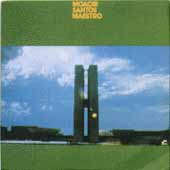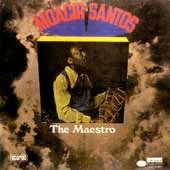
Clique aqui para baixar o disco/Download the album - Mediafire . enviado por J. Neto
........................................................
 O maestro, arranjador, instrumentista, compositor pernambucano Moacir Santos foi professor de Nara Leão, Baden Powell, Paulo Moura, Eumir Deodato, Airto Moreira, entre outros. Compôs, com Vinicius de Moraes, clássicos como "Triste de Quem", "Lembre-se" e "Se Você Disser Que Sim".
O maestro, arranjador, instrumentista, compositor pernambucano Moacir Santos foi professor de Nara Leão, Baden Powell, Paulo Moura, Eumir Deodato, Airto Moreira, entre outros. Compôs, com Vinicius de Moraes, clássicos como "Triste de Quem", "Lembre-se" e "Se Você Disser Que Sim".É pouco para que seja conhecido no Brasil, naturalmente, a não ser pelos ouvintes atentos do "Samba da Bênção" (1962), de Baden Powell e Vinicius de Moraes, que diz: "A bênção, maestro Moacir Santos/Que não és um só, és tantos/ como o meu Brasil de todos os santos(...)". És tantos, mas para poucos, num país onde santos de casa não são muitos....
Seu talento foi reconhecido - coincidência! - quando ele fixou residência fora do Brasil, em 1967, depois de uma brilhante carreira de 18 anos, como arranjador e regente da rádio Nacional, no Rio de Janeiro, e passou a lecionar música na Califórnia.
"Estava ficando difícil viver aqui. Cheguei a pensar em colocar meu carro na praça", lembra Santos, que nos primeiros tempos ganhou a vida tocando piano numa igreja batista, em Los Angeles. Também trabalhou como "músico fantasma", fazendo arranjos para filmes de Hollywood, sem receber créditos.
Um belo dia, foi "descoberto" pelo pianista de jazz Horace Silver, que o conhecera na casa do pianista Sérgio Mendes, e começou a gravar para o mercado norte-americano. Fez grandes discos pela Blue Note e pela Discovery, como "The Maestro" (1972 - indicado para o Prêmio Grammy), "Saudade" (1973) e "Carnaval dos Espíritos" (1975), hoje todos fora de catálogo.
O maestro voltou a ser notícia nos meios musicais brasileiros com o lançamento do CD duplo "Ouro Negro", com 28 faixas, no qual mostra toda sua inventividade e atualidade.
************************

The musical syncretism of Moacir Santos
Born in 1926, in the northeastern state of Pernambuco, the multi-instrumentalist/composer/arranger Moacir José dos Santos (better known as Moacir Santos) had already mastered various brass, string and percussion instruments by the age of 14. In 1948, he moved to Rio and initially worked as a saxophonist at Radio Nacional (Brazil's largest radio network), where he rose to the ranks of arranger and conductor in the following two decades, while expanding his knowledge by studying with the maestro Guerra-Peixe and other prominent music professors.
 In 1967, Santos left a solid career in his native country and moved to Southern California, where he recorded various phenomenal albums as a leader for the Blue Note label in the 1970s. Although he is regarded by the undersigned writer as one of the most innovative Brazilian jazz artists of all time, the author of Nana did not receive the recognition that he truly deserves until the year 2001, when the remarkable double CD Ouro Negro (Black Gold) was recorded in Rio, under the leadership of saxophonist Zé Nogueira and guitarist Mario Adnet, whose all-star team reproduced Santos' original arrangements, as written for the 28 instrumental pieces picked for the album. Compatible lyrics (penned by Ney Lopes) were added to some of the instrumental numbers, using some of the top Brazilian singers of our times (Milton Nascimento, Djavan, Joao Bosco, Gilberto Gil). In order to ensure the authenticity of the proceedings, Santos supervised the recording sessions, while contributing a few vocals, here and there.
In 1967, Santos left a solid career in his native country and moved to Southern California, where he recorded various phenomenal albums as a leader for the Blue Note label in the 1970s. Although he is regarded by the undersigned writer as one of the most innovative Brazilian jazz artists of all time, the author of Nana did not receive the recognition that he truly deserves until the year 2001, when the remarkable double CD Ouro Negro (Black Gold) was recorded in Rio, under the leadership of saxophonist Zé Nogueira and guitarist Mario Adnet, whose all-star team reproduced Santos' original arrangements, as written for the 28 instrumental pieces picked for the album. Compatible lyrics (penned by Ney Lopes) were added to some of the instrumental numbers, using some of the top Brazilian singers of our times (Milton Nascimento, Djavan, Joao Bosco, Gilberto Gil). In order to ensure the authenticity of the proceedings, Santos supervised the recording sessions, while contributing a few vocals, here and there.The following conversation was entirely conducted in portuñol--a mixture of Portuguese and Spanish--in the Pasadena abode of the legendary octogenarian whose personal fusion of U.S. jazz and Brazilian rhythms predates the bossa nova, and whose numerous pupils include the likes of Paulo Moura, Roberto Menescal, Sergio Mendes, Nara Leao, Baden Powell, Flora Purim and Airto Moreira.
LUIS TAMARGO: There is a controversy about your Birthplace. Some say that you were born in Serra Talhada. Others identify your place of birth as Flores.
MOACIR SANTOS: I was born in a hacienda located within the jurisdiction of a city called Serra Talhada. About eight years ago, a festival was organized in homage to my musical work at a military club in Recife's marina, where I was asked in public to identify my place of birth, before an audience that included many natives of both Flores and Serra Talhada. In order to satisfy everyone, I had to come up with a Salomonic response:
"I was born in Serra Talhada, but I opened my eyes in Flores" (LAUGHTER) I was only about three years old when I moved to Flores.
LT: Which is your favorite instrument?
MS: The saxophone, in all of its variations--soprano, alto, tenor, and baritone ...
LT: How many versions of Nana have been recorded?
MS: About 157. A reliable source once mentioned: "Moacir, you should be rich today, based on the earnings from Nana alone."
LT: But I don't see a Rolls Royce parked on your driveway (LAUGHTER).
MS: This sort of swindling happens quite often, particularly in Brazil, and it has affected a number of my compositions.
LT.: Your 1970s Blue Note albums were truly ahead of their time. I recall that your arrangements employed the bassoon and other symphonic instruments that were rarely utilized in jazz at that time.
MS: As the former orchestral conductor of Rio's Radio Nacional network (which apparently wanted to compete with London's BBC) for about twenty years, I had the good fortune of utilizing every instrument at my disposal, from bassoon and French horn to cavaquinho and pandeiro, in order to perform all types of music on a daily basis, from 10 a.m. to 10 p.m.
LT: You wrote quite a few soundtracks, but I suspect that Amor do Pacifico was the most exuberant one.
MS: It involved 75 musicians, back in 1964 or 1965, and it was fihned somewhere in the South Pacific. I was present at its U.S. premiere, where everyone was impressed by the soundtrack. The rest is history ...
Discography
1. Coisas (Forma, 1965)
2. Opus 3 No. 1 (Discovery, 1968)
3. The Maestro (Blue Note, 1972)
4. Saudade (Blue Note, 1974)
5. Carnival of the Spirits (Blue Note, 1975)
6. Ouro Negro (MP,B, 2001)
7. Choros e Alegrias (Biscoito Fino, 2005)
************************
Moacir Santos-(bariton sax,vocal); Oscar Brashear-(trumpet); Frank Rosolino-(trombone); David Duke-(french horn); Ray Pizzi-(alto, soprano); Don Menza-(tenor, flute); Hymie Lewak-(piano); Clare Fischer-(organ) Bill Henderson(electric piano); Joe Pass-(guitar); John Heard-(bass); Shiela Wilkinson-(vocal) Recorded at A&M Studio, L.A., September 29 & October 18, 1972. Joe plays on 5 & 6.

 Br-Instrumental no Twitter
Br-Instrumental no Twitter





13 comentários:
This is fantastic!
Esse blog eh o melhor blog de cds da internet. Eh sempre um cd mais surpreendente que outro. Parabens.
Valeu pelos elogios.
I don't like Rapidshare either, but sometimes (when the album comes up with more than 70Gb) I need to use it. If you know of any server better than RS that supports files over 70Gb, please let me know. I'll surely use that.
And thanks for the compliments.
Superbe music !!! Merci et bravo d'avoir ce desir de la partager !
BRAVO !!! et viva musica !!
De rien! Merci.
Vc merece os parabens dos apreciadores da boa musica instrumental pela divulgaçaoda obra do Maestro Moacir Santos.
Meu primeiro conhecimento dele foi através dqauele LP, Edson machado é samba Novo.
Depois, o maestro partiu para os States e nós ficamos a ver navios, sem que até hoje ninguem reproduzisse seus Lps. Adnet havia prometido faze-lo e eu mesmo cobrei sua promessa. Em vao!
Postanto, gratissimo por essa divulgaçao.
Vc e alguns outros sao nosso herois e ajudam na divulgaçao da boa musica brasileira.
a cultura é do povo!
Moacir Santos - "The Maestro" (1972 - Blue Note - BL-LA Series 007-G)
1 - Nanã
(Mário Telles - Y. Kotti - Moacir Santos)
arranjador
Reggie Andrews
músicos
Flauta - Don Menza
Vocal - Sheila Wilkinson
Voz - Moacir Santos
2 - Bluishmen
(Moacir Santos)
arranjador
Moacir Santos
músicos
Fagote - David Duke
Saxofone Barítono - Moacir Santos
Saxofone Soprano - Ray Pizzi
3 - Luanne
(J. Livingston - R. Evans - Moacir Santos)
arranjador
Moacir Santos
músicos
Trombone - Frank Rosolino
Voz - Moacir Santos
4 - Astral Whine (An Elegy To Any War)
(Moacir Santos)
arranjador
Moacir Santos
músicos
Saxofone Barítono - Moacir Santos
Saxofone Tenor - Don Menza
Voz - Moacir Santos
5 - Mother Iracema
(Moacir Santos)
arranjador
Moacir Santos
músicos
Guitarra - Joe Pass
Órgão - Clare Fischer
Saxofone Alto - Ray Pizzi
6 - Kermis
(Moacir Santos)
arranjador
Moacir Santos
músicos
Guitarra - Joe Pass
Órgão - Clare Fischer
7 - April Child
(J. Livingston - R. Evans - Moacir Santos)
arranjador
Moacir Santos
músicos
Piano - Chaim Lewak
Trompete - Oscar Brashear
Voz - Moacir Santos
8 - The Mirror's Mirror
(Moacir Santos)
arranjador
Moacir Santos
músicos
Contrabaixo - John Heard
Piano Elétrico - Bill Henderson
Trombone - Frank Rosolino
Voz - Moacir Santos
Ficha técnica do disco não tem créditos a todos os músicos que dele participam
rapaz nada com a net para nos dá oportunidade de conecer jóias desta envergadua.
simplesme maravilhoso
esse álbum saiu do ar, poderia ser repostado, por favor.
agradeço desde já.
Bernard,
obrigado por me avisar. Vou disponibilizar novamente todos os discos que saíram do ar neste feriado.
abs
Moacir Santos - The Maestro (1972)
http://www.mediafire.com/?bvnpejrq9pwqwuy
Os LPs que ele lançou na Blue Note foram reeditados em CD recentemente no Japão. Fazia tempo que eu procurava por algo assim. Sacanagem ter que importar coisas que deveriam ser fabricadas aqui...Mesmo assim, vale a pena!
Postar um comentário